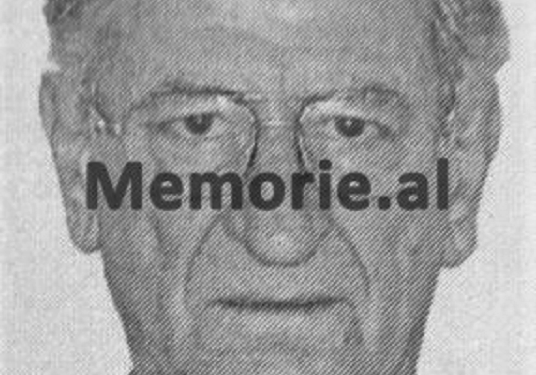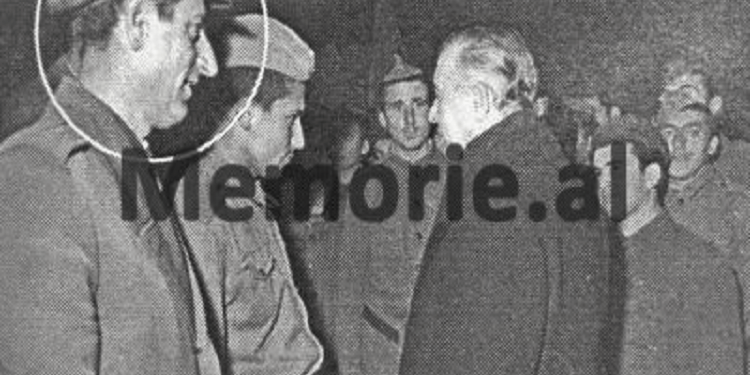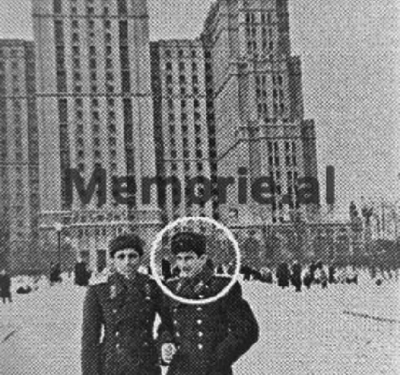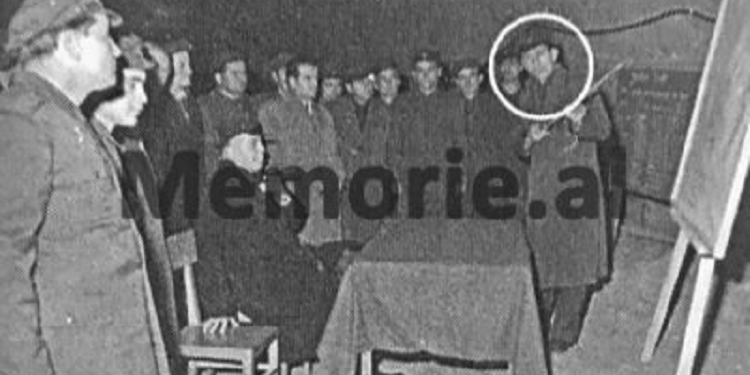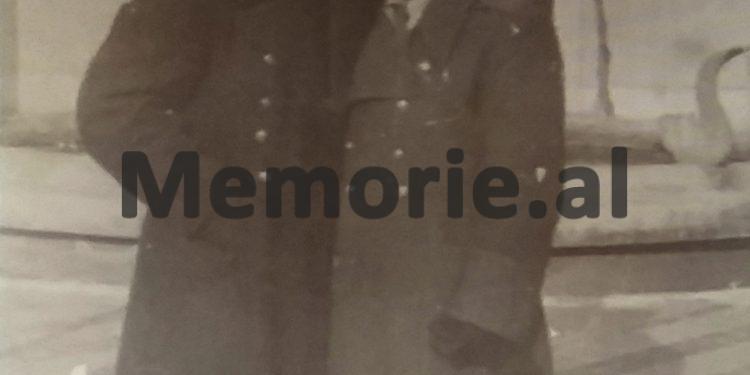Dashnor Kaloçi
Memorie.al publishes the testimonies of the retired lieutenant colonel, Lavdosh Dule, former chief engineer and deputy director of the Institute of Military Studies, who after graduating from the Xenjo Academy in Moscow in 1959, returned to Albania and worked for a long time in the design and the construction of some of the largest military works, such as the airports of Rinas, Kuçova and Gjadri, the Police Weapons Factory, etc. His testimonies about the fierce conflicts that took place in the Defense Council, between Enver Hoxha, Mehmet Shehu, Hysni Kapo, Spiro Koleka, etc., mainly about the Gjadri airport and how the work started on the construction of the Headquarters Command site was interrupted General of the Army, which would be a giant underground object, for which the construction of a three-meter high tunnel was also started, which would connect the Brigade Palace with the building of the Central Committee of the ALP and some shelters that were in the yards of Enver and Mehmet’s house…?!
Mr. Lavdosh, can you tell us about your past?
I was born in 1928 in the city of Vlora and the origin of our family, which has been a patriotic family and completely connected to the war, is from the village of Tragjas. After finishing the primary school and the unique one in Tragjas and Vlora, I followed the lessons in Tregtare in Vlora, which I interrupted because I became a partisan in the 12th Assault Brigade. Immediately after the war, I was appointed as the Youth Secretary for the Mesaplik of Sevaster and in 1945; I went to the Soviet Union where I studied engineering in Moscow and Leningrad. After finishing my studies in 1948, I returned to Albania and was appointed as the head of Xenio in the 4th Regiment of Gjirokastra. In 1949, I took part in the fighting of the “August Provocations” and after being wounded in Kamenik, I was transferred to Vlorë where I served until 1952. In that year I was transferred to Tirana, near the Design Bureau in the Ministry of Defense, where I worked until 1959, when I went back to the Soviet Union to study at the Military Engineering Academy in Moscow. With the breakdown of relations with the Soviet Union in 1961, I returned to Tirana and graduated from the Faculty of Civil Engineering. From 1961 to 1975, I worked in the Bureau of Designs and then in the Institute of Studies and Designs of Defense Works, where I served as chief engineer and deputy director of that institute. During those years, I was involved in the study and design of a number of military works, such as the airfields of Kuçova, Rinas, Gjadri, the Police Weapons Plant (area A underground), etc.
In which of the projects you did at that time, did you feel the greatest responsibility?
The responsibility was the same in all the works we did at that time, but I can single out the project of the central command post of the General Staff of the Army, in 1967, which was to be built below the Palace of Brigades. We prepared that project with the help of the Chinese, and the whole facility, which would be built underground, resembled a small city, where one would live and work with all the necessary conditions and comfort.
Did the works start after the project you did?
In that year, work began on the implementation of that project, with the construction of a 3-meter high tunnel that connected the Palace of Brigades with the Central Committee and the shelters in the villa of Enver Hoxha and Mehmet Shehu. But after the construction of the tunnel, that project was interrupted and the works for the construction of the central command post under the Palace of Brigades did not start again.
Why was the implementation of that project stopped?
I don’t know, but maybe because it cost a lot. But even though I was a co-author of that project, nothing was communicated to me, as those things were considered state secrets.
Of the projects that gave you the most problems, who do you remember?
The project for the Gjadri aerodrome has caused us many problems, since the former Prime Minister Mehmet Shehu did not want it to be built there, but in the village of Hekal in Mallakastra. For the construction of the new aerodrome, which was decided to be done, Mehmet Shehu had called me to several meetings and had offered me several places as alternatives, such as Shtoji in Shkodra, Lumalasi in Korça, Pish-Poron in Vlora, Cërrik, Gjirokastra, etc. After I was appointed as the head of the working group of 30 people (15 Albanians and 15 Chinese), in November 1970, I was called to report to the Defense Council. With me was the Deputy Minister of Defense, Mendu Backa, and the Commander-in-Chief of Military Aviation, Edip Ohri. In that meeting, which took place in one of the halls of the Central Committee of the APS, it was decided, among other things, about the construction of the new military airport, which had been discussed for a long time. When we entered there, Enver Hoxha himself welcomed us at the door, meeting us all in turn.
Have you ever met Enver Hoxha before?
I first met Enver in 1957 at the Rinas airport, where the entire Politburo had come to see the landing of the “TU-104” plane, which was coming from the Soviet Union, to pick up Marshal Zhukov, who was on an official visit to our country. To make it possible to land such a large plane, we had been working for more than a year on the project to expand that airport with a runway of 2800 m. who had trusted me. With the arrival of the Russian “TU-104” aircraft, the runway was approved, for which I received special thanks from Enver Hoxha. But to be more precise in the question you asked me, I wanted to emphasize that for the first time, I met Enver in 1943 when he came to our village in Tragjas, Vlora, to destroy the so-called “Factionist group of Sadik Premte “. At that time I was no more than 15 years old and while I was looking enviously at an automatic rifle that Enver carried around his arm, he said to me: “One day you will also have such a rifle, as you will you have kidnapped the enemy”.
Let’s go back to the meeting of the Defense Council, who participated there?
In that meeting of the Defense Council, to which I was also invited, in addition to Enver Hoxha, who was also the Commander-in-Chief of the Armed Forces, Prime Minister Mehmet Shehu, Secretary of the Central Committee of the ALP, Hysni Kapo (who on the way the party covered the Ministry of Defense and the Ministry of the Interior) and the Chief of the General Staff of the Army, Petrit Dume, who had replaced the Minister of Defense, Beqir Balluku, who was ill.
Who first opened the meeting?
As usual, it was opened by Enveri, who said: “We have called these friends to discuss the airport, so that we can do the best.” After Enver’s first words, Mendu Backa stood up to report, but Enver interrupted him saying: “Not you Mendu, let Lavdoshi speak to us, because he did the projects.” After that I stood up and reported all the possible variants of the places where the new military airport could be built, mentioning both their negative and positive sides. But I focused more on the Gjadri airport, since we were of a unique opinion with Mendu Backa and Edip Ohri regarding its construction. At the end of my speech, which lasted about 20-25 minutes, Enveri said: “You heard Lavdoshi, let’s do Gjadri.” As soon as Enver finished, Mehmeti immediately intervened, saying: “Comrade Enver, there is a problem with the construction of that aerodrome, as he requires the relocation of the Balldre-Bushat national road of 25 km, which costs 300 million Lek (new). After Mehmet’s intervention, Enveri turned his head to me and said: “How is this work Lavdosh, tell us”. I replied: “It’s the same as the prime minister says; only this road does not cost 300 million ALL, but only 62 million 500 thousand ALL. Before I had finished speaking, Mehmeti intervened again somewhat nervously, saying: “In short, this road costs 300 million lek and this was told to me by the Minister of Construction, friend Rrahman Hanku, whom I personally charged to calculate the cost of that road. Rrahmani, in addition to being a minister, is also a member of the Plenum of the ALP Central Committee and he does not lie to us”.
After those words of Mehmet Shehu, what happened?
I intervened again saying: “Comrade Enver, this road makes 300 million and 500 thousand ALL”. While Mehmeti tried to speak again, Enver Hoxha interrupted him saying: “It’s like you say, Rrahmani doesn’t lie to us, we’ve proven that, but Lavdoshi doesn’t lie to us either, because we’ve proven Lavdoshi.” Rrahmani did not do the project of that road himself, of course he commissioned someone else and we don’t know if he is lying to us or not. That’s why I say to believe Lavdoshi and not Rrahman, that Lavdoshi made that project himself. Do you agree?” After we all raised our hands saying: agree, agree, and Mehmet Shehu did not speak anymore, the meeting was closed. While Enveri was escorting us to the door and meeting us all, Mehmeti intervened again saying: “Agreed, but 48 hectares for the runways and not 49”. I did not speak, but Hysni Kapo intervened and said: “We decided this matter once”.
Only Hysni Kapo reacted after Mehmet’s words?
No, Enveri reacted and said: “50 or 55 hectares, it doesn’t matter, we decided this once. Now leave for China and try to get as much machinery as possible for the construction of the Gjadri airfield, but not from Chu En Lai’s line, but from Lin Biao’s”.
What did Enver mean by those words, where Chu En Lai’s line differed from Lin Biao’s?
The Prime Minister of China, Chu En Lai, gave us aid on credit, while the Minister of Defense, Lin Biao, gave it to us for free.
How were you received in China, did the Chinese give you the materials you were looking for for the Gjadri aerodrome?
We were received very well and for our delegation headed by Mendu Backa, they had reserved the “Pekini” hotel. Also, for our delegation, the Chinese made available a special plane with which we traveled for about 2 months in many cities and other countries, where there were various military facilities that interested us. At the end of our visit, we were also welcomed by Chu En Lai, who, among other things, told us: “We will help you since you are at the front of the war, but these are our possibilities. We’re sorry that we can’t fulfill all of them, but Vietnam is also struggling here, which needs a lot of help.” In fact, we asked for a lot of help, and in the agreements we signed with the Chinese side, they did not undertake to provide us with all of them. After the visit to China we returned to Albania continuing our work with the designs.
How long did you work at the Defense Design Research Institute?
I worked until 1975 at the institute, where I served for a long time as chief engineer and deputy director, when I was removed from there after some reservations I had regarding the idea of tunneling and mass bunkering of Albania. Enver Hoxha personally proposed this idea at the 12th Plenum of the Central Committee of the ALP, after the attack on Beqir Balluku’s group, accusing them of leaving the country without the necessary fortifications. The thesis of tunneling and fortification of Albania. Enveri had initially thrown it from 1973, saying: “Tunnels have three advantages: one, they protect us, two, we save arable land and the third, constructions in tunnels are cheaper than on land.” But this third, which Enver said, did not hold, and at that time I showed my reservations.
More specifically, what were your reservations regarding the ideas that Enver Hoxha had put forward?
At a party conference in 1975 I opposed the idea of tunneling and fortifying the country, saying that it was not true that construction in tunnels was cheaper than construction above ground. This, which I openly expressed at the time, caused a great stir as it was against the directives of the top leadership. This thesis of mine was also defended by the Ministry of Construction at that time. After that, Prime Minister Mehmet Shehu called me and Mendu Backa to a face-to-face meeting, where Spiro Koleka and Sali Angoni were also assisting; who, as representatives of the Ministry of Construction, had prepared a material defending the thesis that construction in tunnels was more expensive than on earth. After getting acquainted with that material, Mehmeti turned to Spiro Koleka, saying: “It is a shame and capitulation that you come out with this thesis”. After that, Spiro replied: “I have argued that our thesis stands and I have neither been ashamed nor capitulated.”
What did Mehmet Shehu say after that?
Mehmeti turned to the stenographer saying: “Write it down, the prime minister made a mistake, I retract my statement.” After that, he started to fill our minds that we were not right.
Mehmet Shehu has been evaluated as one of the most skilled soldiers that Albania has had how he could not know that!?
What you say is completely true, but Mehmet did not allow anyone to touch the land of bread. Although I was against the idea of tunneling the country, I cannot but accept the fact that Mehmet Shehu was a very smart man, very prepared and a very capable soldier. He could not be compared to any man from all the cadres of that time.
How was your opposition to the idea of tunneling the country closed?
After I raised it, at one of the Party’s conferences, one of the Deputy Ministers of Defense told me: “You want to sabotage the tunneling of the army, I have everything here in this file, you will answer”. I told him that I had raised them in the party organization and I was not afraid to raise them again. Thus, in another meeting with Mehmet Shehu, where the problem of placing bunkers in the field was raised (in which Alfred Moisiu, Mendu Backa and Abedin Galanxhi also participated) I indirectly opposed the idea of tunneling. After my objection, Mehmet Shehu told me: “You have no partisanship, you forget that we are a people ready to rise before the enemy at the first signal of the party”, he continued by making other moralizations of this nature. I didn’t feel any more, but those attitudes that I had expressed openly, caused me to be removed from the position of deputy director of the Institute and sent to the 5th Puka Corps as Genio chief. I served there in that corps until March of 1981, when I was transferred and brought to Tirana as the head of the Military Sector, near the Municipal Ministry. I served in that position until 1975 when I was retired./Memorie.al




